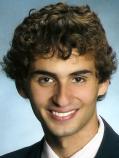

Major: Anthropology, Physics
Thesis Advisor: Nusrat S. Chowdhury
Q: Can you tell me a little bit about your thesis?
A: I’m writing a thesis about pro- and anti-nuclear activism for/against Vermont Yankee Nuclear Power Plant, which is in Vermont near its border with New Hampshire and Massachusetts. The thesis is not about whether it is a good idea or a bad idea to close this very contentious plant (about which there is plenty of debate and writing out there), but rather trying to write an interpretive anthropological thesis about why is it that people on both sides of the debate believe what they do, how those beliefs are carried out in their activism, and maybe a bit on what this means in terms of society and policy.
Q: So you’re finding that it’s pretty interdisciplinary?
A: Yes. I mean, it’s an anthropology thesis but I’m also a physics major and there are certainly seriously scientific components of nuclear power. There are also definitely psychological components; lots of environmental issues that you might say are more like environmental science or studies. And there’s also the anthropological component of doing the interviews and the often more interpretative lens associated with that discipline. I’ve found that part of the reason that nuclear power is so complicated (and climate change is another example of something that I think is like this) is because it is so interdisciplinary, and that makes it very hard to just consider through one lens.
Q: How did you come upon the idea for your topic?
A: Last spring, I was thinking about doing an anthropology thesis, but I spent the past three years also being a physics major and I thought “What can I do that combines my interests?” I often get asked, “How could you be an anthropology-physics double major? Like, how did those two things combine?” And so I started looking around at different projects and different things going on. In particular, I was taking this class, Inquiries into the Catastrophic with Chris Dole, one of the Mellon Seminars. We were studying risk and in particular, reading this book by Adriana Petryna called “Life Exposed” about citizenship and rights after the Chernobyl disaster in what’s now Ukraine. Through taking the class, I came to see that nuclear issues really are not only scientific, but are overlaid with all these important cultural variables that play into how people respond to these issues and also ultimately contribute a lot to the policies. There are very serious long-term implications beyond just the science that the industry tends to not think about, or at least not make policies to the effect that they’ve thought about it. I thought the nuclear issue would be cool and interesting, and I found that there is all this protest going on in this particular plant up in Vermont, and that’s how I decided this would be a good topic to pursue.
Q: And how are you finding the process of thesis-writing?
A: I really love my thesis when I’m working on it. I love interviewing people, I love going to the public service board hearings, and I like the reading I get to do about nuclear power because I just find it a fascinating issue. The thing that most concerns me is: When do I start doing the writing, and how hard or difficult is it going to be to write something so long and in-depth? And the other thing I think I get really concerned about is when I’m not working on the thesis, it feels like I should be. Nuclear power is of course a contentious topic, and I want to write a thesis that I think is both honest and interpretative, but it’s hard. It’s not an easy issue. You don’t want to be seen too much as taking a side, you want people to read it and take your work seriously, so I try to think a lot about how that can be done. My goal is to try be as factually accurate as possible and also to take an interpretative tact that is both novel and useful and says something that people on both sides of the debate will read and say “Hey, that’s interesting.”
People always say you should choose a project that’s “really great and interesting to you.” And it sounds hackneyed, but of course it’s true. I would just add that it’s really great in the social science disciplines to be able to get to choose your topic, and I would encourage people to take advantage of that opportunity. It’s not like you just have to work on what the professor specifically researches. If you have something that you’re really interested in, think about it and look around for issues that better jive with your interests.